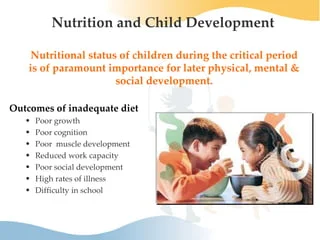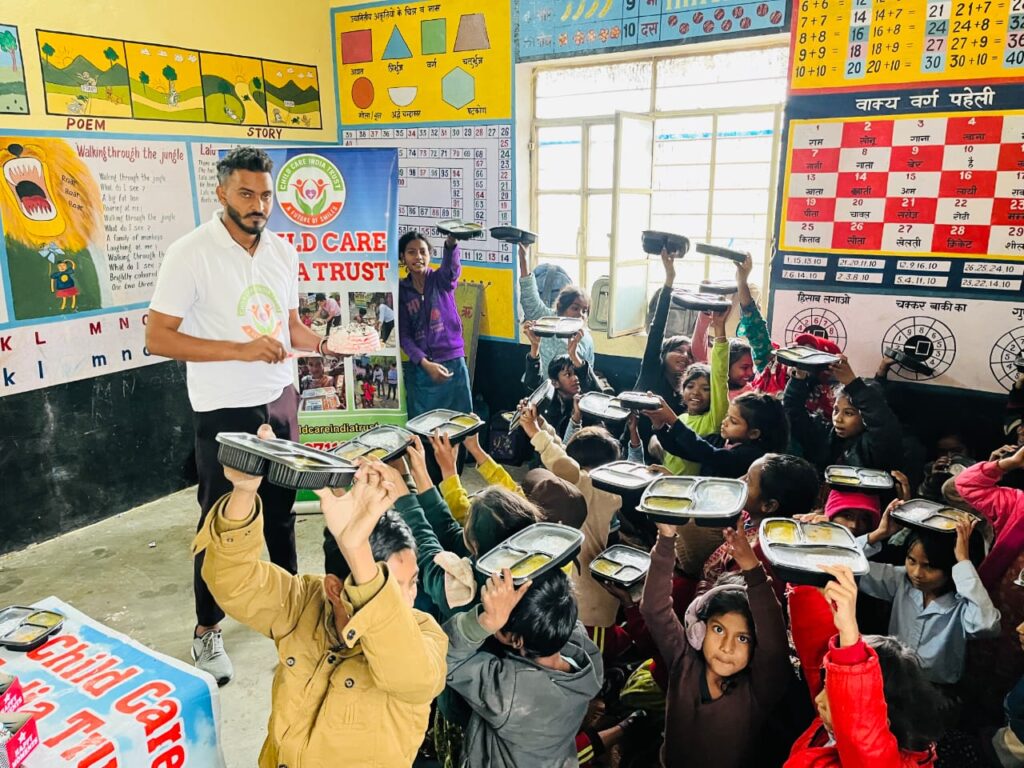The Importance of Nutrition in Child Development
Introduction
- The role of nutrition in a child’s growth and development
- Why early nutrition is crucial, [The Importance of Nutrition in Child Development]

Understanding Child Development and Nutrition
- What is child development?
- Key stages of growth and their nutritional needs
Essential Nutrients for Child Growth

Macronutrients
- Proteins: Building blocks of growth
- Carbohydrates: Energy source for active bodies
- Fats: Essential for brain development
Micronutrients
- Vitamins: Their role in immunity and growth
- Minerals: Importance of iron, calcium, and zinc
The Impact of Poor Nutrition on Child Development
- Malnutrition and stunted growth
- Cognitive impairments due to nutritional deficiencies
- Weakened immune system and frequent illnesses
The Role of a Balanced Diet in Early Childhood
- Importance of breastfeeding
- Introduction of solid foods and dietary diversity
- Recommended daily intake of nutrients
The Link Between Nutrition and Brain Development
- Omega-3 fatty acids and cognitive function
- The role of iron in brain development
- How sugar and processed foods affect brain performance.
How to Ensure Proper Nutrition for Children
- Planning balanced meals
- Encourage healthy eating habits
- The role of hydration in child health
Common Nutritional Deficiencies in Children
- Signs and symptoms of deficiencies
- Preventing deficiencies through diet and supplements
The Role of Schools in Child Nutrition
- School meal programs and their benefits
- Educating children about healthy eating
Parental Tips for Promoting Good Nutrition
- Meal prepping for busy parents
- Making healthy food fun for kids
- Overcoming picky eating habits
- The Importance of Nutrition in Child Development
Conclusion
- Recap of the importance of nutrition in child development
- Encouraging lifelong healthy eating habits
FAQs
- What are the best foods for brain development in children?
- How can I ensure my child gets enough protein?
- What are some signs of poor nutrition in children?
- Can poor nutrition affect a child’s behavior?
- How do I encourage my child to eat more vegetables?
The Importance of Nutrition in Child Development
Introduction
Nutrition plays a fundamental role in a child’s growth and development. From the moment a child is born, proper nutrition ensures healthy physical and cognitive growth, laying the foundation for a thriving future. But why is nutrition so crucial, and how does it impact different aspects of a child’s life? Let’s dive deep into the importance of nutrition in child development. The Importance of Nutrition in Child Development
Understanding Child Development and Nutrition
What is child development?
Child development refers to the physical, cognitive, social, and emotional changes that occur in children from infancy to adolescence. It is influenced by genetics, environment, and, most importantly, nutrition. The Importance of Nutrition in Child Development
Key Stages of Growth and Their Nutritional Needs
Each stage of a child’s life demands specific nutrients to support their rapid growth and development. Infants require essential fatty acids and proteins for brain development, while toddlers need a well-balanced diet to sustain their high energy levels. As children grow older, their nutritional requirements continue to evolve. childcareindiatrust.
Essential Nutrients for Child Growth
Macronutrients
Proteins: Building Blocks of Growth
Proteins help build and repair tissues, making them crucial for muscle and organ development. Good sources include lean meats, eggs, dairy, beans, and nuts.
Carbohydrates: Energy Source for Active Bodies
Carbs provide the energy children need to play, learn, and grow. Whole grains, fruits, and vegetables are excellent sources of healthy carbohydrates.
Fats: Essential for Brain Development
Healthy fats, such as those found in avocados, nuts, and fish, support brain function and hormone production.
Micronutrients
Vitamins: Their Role in Immunity and Growth
Vitamins such as A, C, D, and E contribute to strong immunity, healthy skin, and proper vision. They can be found in fruits, vegetables, and dairy products.
Minerals: Importance of Iron, Calcium, and Zinc
- Iron: Essential for oxygen transport in the blood
- Calcium: Necessary for strong bones and teeth
- Zinc: Supports immunity and cell growth
The Impact of Poor Nutrition on Child Development
Poor nutrition can lead to severe consequences, including:
- Malnutrition and stunted growth
- Cognitive impairments and learning difficulties
- Weak immune system and frequent illnesses
The Link Between Nutrition and Brain Development
- Omega-3 fatty acids boost cognitive function
- Iron deficiency can lead to learning difficulties
- Too much sugar and processed foods can negatively affect focus and behavior
How to Ensure Proper Nutrition for Children
- Offer a variety of foods to ensure balanced nutrition
- Encourage healthy eating habits early
- Keep children hydrated for overall well-being
Conclusion
Good nutrition is the foundation of healthy child development. Providing a balanced diet, rich in essential nutrients, ensures children grow strong, stay healthy, and perform well academically. By fostering good eating habits from an early age, parents and caregivers can set children on the path to a lifetime of health and well-being.
FAQs
- What are the best foods for brain development in children?
- Foods rich in omega-3s, such as salmon, walnuts, and eggs, help boost brain function.
- How can I ensure my child gets enough protein?
- Include lean meats, dairy, beans, nuts, and soy products in their diet.
- What are some signs of poor nutrition in children?
- Fatigue, frequent illnesses, delayed growth, and poor concentration.
- Can poor nutrition affect a child’s behavior?
- Yes, lack of proper nutrients can lead to irritability, mood swings, and concentration issues.
- How do I encourage my child to eat more vegetables?
- Make veggies fun by mixing them into favorite dishes or presenting them creatively.


